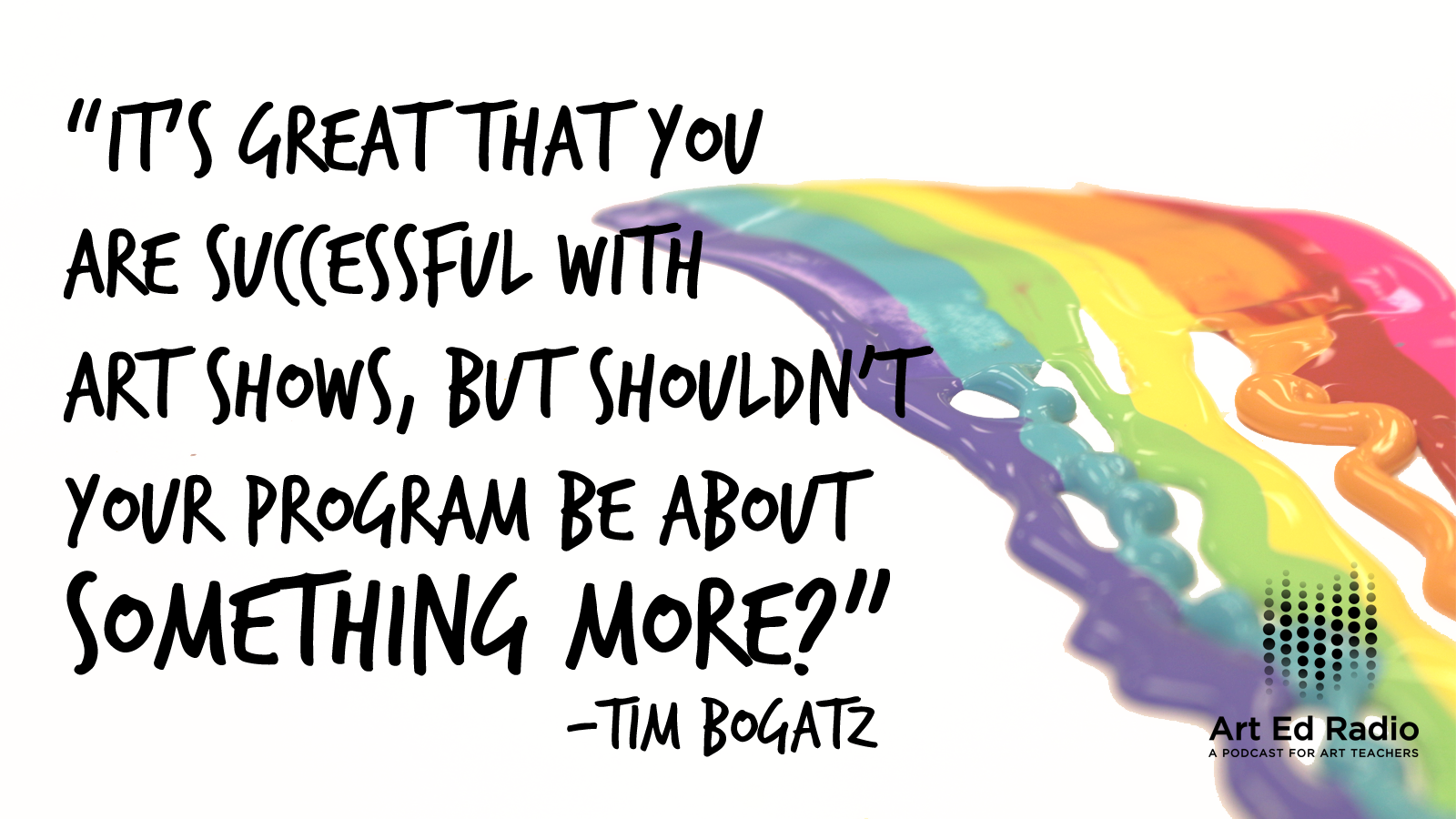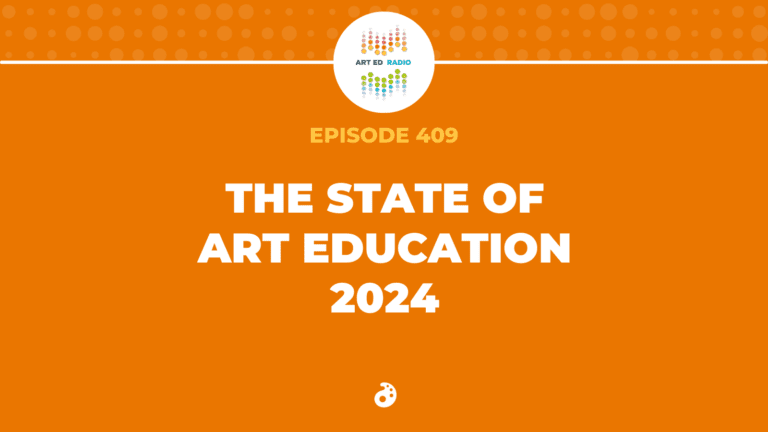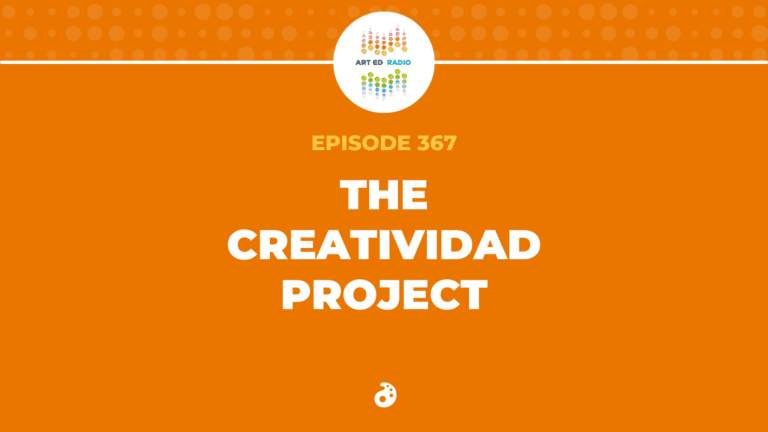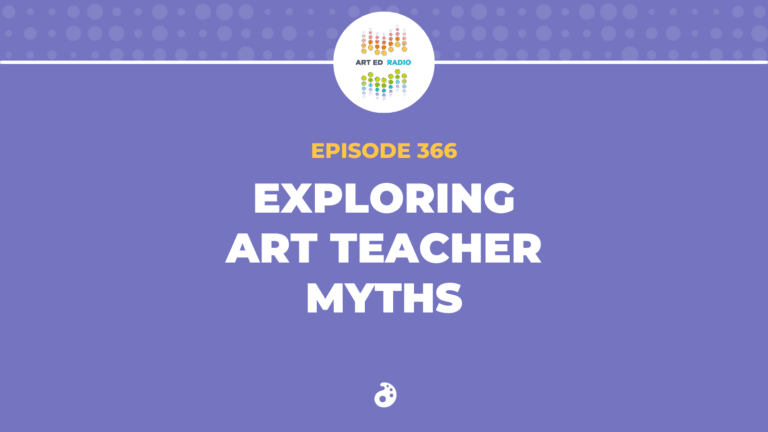This part of the school year is full of art shows and competitions, which can do a lot for your program. They can be an advocacy tool, and a motivating factor for your students–but they can also take the focus off what really matters in the art room. Do you embrace that competition, or are there more important things happening in your art room? Tim and Andrew talk about their personal approach to art shows (4:00), how you can use competition to build the confidence of your students (7:00), and whether competition really can help develop creativity (12:15). Full episode transcript below.
Resources and Links:
- What should we be focused on in the art room?
- What is the purpose of Art 1?
- There is a lot of power in showing every student’s work

Transcript
Welcome to Art Ed Radio, the podcast for art teachers. This show is produced by the Art Of Education and I’m your host, Tim Bogatz.
It’s art show season, that lovely time where you spend all day and all night helping students matte work, fill out entry forms, get organized, and then when it all comes to a head you get to spend your Saturday actually attending the show. It’s a huge sacrifice but it can do so much for your program and so much for your students. But I guess the question is, how much do we embrace that? Because for me, when I first started teaching, I really thought that art shows were so important.
We had a city-wide art show at the school where I taught, where I thought that was the measuring stick to see where our program was. The first year I took all of my students’ work, which I thought was spectacular, and we won a grand total of 0 awards. It was a little bit devastating for me as a teacher but also at the same time it gives me a little bit of an incentive to get better. The next year we go back and we actually win three awards, and this is out of a total of like 27. That’s a small progress but at that point I’ll take it.
Then the year after that I’m trying to catch up to this other school that’s amazing. Our third year we actually got an even split and we took home just as many awards as they did, which was huge for us. Then the year after that we absolutely dominated the show and we took like 23 out of the 27 awards.
That was kind of what were doing year after year after year, but then I thought to myself, “Now that we’re winning these awards what else do we have to shoot for?” That was the point where I decided and I guess I came to realize, that art shows are not the end-all, be-all. That was when I figured out that what we teach in the art room goes far beyond what goes up on the walls or the work that goes to art shows. Yeah, it’s awesome that your program can win a bunch of awards, but what else do you do?
Because it’s tough to start answering those questions. When you’re teaching elementary school your art show is the biggest event of your year. That’s when so many parents, families, other teachers and colleagues, your administrators see what your kids do. For better or worse that’s when all of those people judge you. It’s tough not to get wrapped up in that. It’s tough for your kids not to get wrapped up in that but you need to make sure that your teaching goes beyond that one night, goes beyond that art show.
It’s much more than just that finished product. There are skills and ways of thinking that you need to develop in your students. My question for this episode again is how much we embrace that. Can you embrace those art shows or those competitive instincts to get better work from your kids? Can that competition enhance kids’ creativity? Does seeing all that work inspire your kids or does it intimidate them? How do you deal with each of those view points. We need to talk about all of those things and I think it’s probably time for a good discussion with Mr. Andrew McCormick.
All right, I am here with Andrew McCormick. Andrew, how are you?
Andrew: I am doing good man. How are you doing?
Tim: I’m great. Let’s talk competition. I know for a lot of teachers out there it is art show season, right in the middle of Youth Art Month, so let’s talk art shows. What is your mindset when it goes into art shows? Are you one of those competitive types who wants to win a bunch of awards? Or do you look at these shows as more of an opportunity for kids to show their work and see what other students and other schools are doing in their classrooms?
Andrew: Is there an option C?
Tim: Yeah, yeah.
Andrew: Okay, so my answer would probably be option C. I will tell my students, and I am sincere when I say this, like, “I just want you to have a good experience and see what’s out there and put your best artwork forward and learn from this.” Then also at the same time like, “I want to win everything.” I try to keep that sort of competitive, “I want to win and I want to be the best program and I want to be the best middle school art teacher,” I try to keep that a little hidden or secretive because I do think it can actually be a little toxic, because no one gets into art making either as a career or as a hobby, something they like, to win all the prizes and to get all the money. You do it because you want to communicate and you have it in you and it has to come out and you enjoy the creativity. I don’t know, it’s kind of both.
Tim: Yeah. You know honestly I was hoping for a really nuanced answer there when you came in with option C, but really I’m just finding out that you’re super passive-aggressive.
Andrew: I am. I totally am.
Tim: All right, so let’s talk about that awards mindset though. Do you think that winning those awards can serve as an advocacy tool for you or for your program? Because, I don’t know, I always find that it’s so tough to quantify art and explain what we do those administrators that really have no clue, and same with parents sometimes, but it’s really easy to say, “Hey, at this art show we won 15 awards, a ton of them are gold. We’re awesome.” That’s really easy for people to understand and it’s a quick and easy way to show your program is having success. In that way do you think it’s worth at least spending some time focusing on the awards?
Andrew: Yeah, actually I would say that’s about the only reason I do it. There is another reason but I don’t know any art teacher who on a surface level enjoys award seasons and award things. I want to collect all this work, I want to chase kids down and hound them to give me their artwork, and then I want to stay late at school to matte it and sand it off and print off the right … It’s a lot of work and it’s a hassle.
I think to me the two big reasons why we do it year after year is for the advocacy piece, but then also to show those students you’re good at this and you could keep going. It’s to build their confidence and love of art down the road. I say that I want to win, and that’s maybe just my own DNA, biology of like, if I’m going to do something I want to do it well, but it’s really not about me it’s about the program and advocacy and the students.
Tim: Yeah, I think it’s a great tool to build confidence in your students like you said. It really can serve as this great justification for them, they spent 30, 40, 50 hours on this project and that’s good in and of itself but winning an award can really justify that. I do have to disagree with you on one point because I know a lot of teachers that live for art shows. That is what they are in teaching for. They go crazy, they brag about their awards, they brag about their scholarship money, et cetera, et cetera, et cetera. I feel like they’re almost trying to define their program by how they perform at competitions.
I don’t even know if I’m just going to rant here and if there’s even going to be a question at the end of this but I see a lot of problems with this approach. First it puts a ton of pressure on kids, because what if their project isn’t perfect? What if it didn’t turn out exactly the way they wanted to? They lose sight of the process, it feels like the work that they’re putting in really doesn’t mean anything.
Then also, you have so many kids, and we’ve talked about this before, that are never going to be artists. They are never going to be great at this but there’s so much more that we do in our program. We are not a production factory. If you just worry about the end product, if you just worry about the end, like art show, you’re totally leaving those kids behind. Then when you leave them behind you lose all the focus on the process of art making. Kids aren’t worried about what they’re learning or how they’re getting from point A to point B, they’re just worried about, “What do I end up with?”
That makes it really difficult to reflect, to concentrate on the process, or even to be aware of those little steps that can build confidence and those little successes that can do so much for them. After all of that is said and done, what if you go to the art show and it’s a bad day? Maybe your work didn’t get delivered right, maybe it’s hung poorly, or maybe you have a judge who doesn’t know enough or they make some bad decisions and you’ve put months of effort into this, and nothing comes of it.
I feel like that mindset is going to, I don’t know, be negative for far too many of our kids. Like I said, I don’t know that there’s a question there but do you have anything you want to say about that or should we just move on?
Andrew: No, yeah, I think you’re right. I think that people who think that way about, “That’s how I define success for both my program and my students,” they’re playing with fire. It’s a little dangerous because, and allow me to go off on a rant here, I do think that awards are just like prizes, gold stickers, gold stars, extra recess, $5 for getting an A on your report card. There are all these extrinsic motivators, right? What extrinsic motivators will do is they’ll actually erode a person’s ability to develop and hone and listen to their intrinsic motivation, which is, “I just want to make super awesome artwork because it feels good to make super awesome artwork, and I want to communicate and it’s pretty fun.”
What happens to those kids who have been cultivated in a program where it’s like, “It’s gold key or bust sucker,” and then there is no more competitions out there, there are no more people telling them how special and wonderful they are. Are they actually then going to see the inherent worth of making artwork? Or are they just going to put in on the shelf because there’s no more prizes out there to be earned? I think it’s dangerous that people approach it that way.
Tim: Yeah, I think that’s a very good way to put it. I like the playing with fire analogy. Let’s, I don’t know, I guess flip that mindset. Maybe I can play devil’s advocate here. Let’s ask I guess the main question of the episode, can competition help creativity? There are some kids out there where it does serve as a motivator for them, right? I’ve found that a lot of kids are really motivated by putting their work up against work from other kids. Whether it’s a small thing, like what’s up on the wall, what’s up on the bulletin board, or a big thing like a state-wide art competition. They love that competition aspect, so do you think that it’s worth pursuing those opportunities for those kids?
Andrew: It’s tricky because I think it’s rare the kid that can handle them both. If we’re thinking about a fourth grader or an eighth grader or a twelfth grader, think about a kid who can be like, “Yeah, I want a little dose of competition but I’m also totally cool if I don’t win. I understand it’s about the process.” You would look at this kid and be like, “Who the heck are you, that you’re this mature, that you understand this?”
I think myself personally, I have some students like that in my room that can handle some competition but also take it for what it’s worth. I think it probably depends on how much it’s getting pushed and if as an instructor you can frame it well. I even see in my own classroom there’s a competition to see who is the best at drawing. Some of that is healthy, okay well you are pushing yourself internally to be as good a painter or a drawer as the person next to you, but then way too often I see the negative side of that, which is 90% of my students look around the room and say, “Well, I’m not as good as that person.”
Tim: Yeah, “I’ll never be that good.”
Andrew: Therefor, why even try? I think part of that is a reflection in our society, which is, if it ain’t easy it ain’t worth doing. I’m trying to battle that a lot in my classrooms, but if I’m not the best right now, I’m out because I don’t want to have to work hard or struggle for something. I don’t know, I think as a teacher it’s our job to like you said, use it as an advocacy tool, as a tool to motivate people, but definitely be careful with it and take it with a grain of salt for what it’s worth.
Tim: Yeah, absolutely. You hit on a point that I think is important, which is a lot of time the students or the class will adopt the mindset of the teacher, and so if you’re pushing award season kids are going to be so focused on that. But what I always tell my kids is, “We’re going to do these competitions. If you want to enter, that’s awesome, if not that’s cool. If we win awards that will be great but there are so many variables because you don’t know what other schools are bringing, you don’t know who’s judging, you don’t know what the judge like. You can’t go in expecting awards because you’re just going to set yourself up for disappointment. If you win them that’s great, but your work still has value, just because one person doesn’t like it doesn’t mean it’s not worthwhile or it’s not good work.”
I think you have to frame it in the right way for your kids and help them adopt the mindset where there are benefits here but these shows are not the end-all, be-all. I guess that’s the way that I try and find a balance where your competitive kids do have those opportunities but you’re not forcing it on those kids who don’t want to compete or don’t want to mess with it.
I guess my question for you here is, let’s try and I guess find that balance here, because you have so many opportunities for your best kids, the ones who really love art shows, really want that competition, but there’s not as much for kids who don’t want that competition. If you have your students who are kind of shying away from competition and you don’t want to force them into it, how do make sure that you’re still challenging those kids?
Andrew: My experience has been that kids that are actually making really good work and then … I always ask kids, I don’t just like, “You’re doing it.” That’s a person who’s way too into it and way too into the ego of awards and everything. I’ll ask them and I would say 99% of the kids I’ve ever asked like, “Do you want to … Can I submit your work to this? I really like it?” They almost always say yes. They’re almost always flattered.
Every once in a while I do get a couple who are like, “No, I don’t want to,” and that to me is actually a sign of a kid who really has a lot of maturity. They know that they just made good artwork for their own and maybe they don’t want the hassle or the drama of, “I think I might win but I’m not going to.” I don’t know, I think that the kids that you might consider for an art show, they’re making good work so I don’t know that there’s much you have to push them to.
I guess I don’t know that there’s that many students who are making super awesome artwork that aren’t then also having an opportunity to go to a show that I would have to worry about pushing them further then. Does that make sense?
Tim: Yeah, that makes a lot of sense. I would say, every once in a while I’ll run into a kid where we’ll send work and they don’t want to but then if you talk to them a little bit more, if you dig a little bit deeper, it’s maybe because they aren’t confident or they don’t feel like their work’s good enough. So then I think as a teacher your role is to encourage them and say, “No, this is good enough. You may win, you may not win but you belong in this show.”
Then if they do end up winning an award that’s even more confidence for them, but just being in that show gives them some pride in what they do. I think if a kid is not interested it’s worth it for you to dig a little bit deeper. All right, I think that’s going to do it for us though. Andrew, good talk. I appreciate you coming on.
Andrew: Yeah, no problem man, my pleasure.
Tim: All right, as always that is a great conversation with Andrew, so big thanks to him for coming on and talking to me. I really think what he had to say about challenging students, it gives me a little food for thought, so I like that discussion. Now, the last couple three weeks here we have been talking about differentiating for all of our different artists, what you do with early finishers, what you do with your slow workers and how we deal with kids and competition.
It made me think probably the best course for me to recommend to you from the Art Of Ed is called Reaching All Artists Through Differentiation. It is a five week class worth three graduate credits. It is all about how you can differentiate and how you can prepare for every type of student in your classroom. Whether that be advanced placement kids, special ed kids, different backgrounds, cultures, interests. You have so many different kids coming through your room. This course helps you teach all of them. If you’re interested in checking it out, it’s called Reaching All Artists Through Differentiation. We’re going to start a new course beginning or April, May, June, July and August, so you can definitely check it out at theartofed.com/courses.
Now, if I go ahead and close the show out here, I want to tell you, I feel like I say this every other episode probably but in thinking about our discussion today, your art room is not a production factory. We have so many more valuable things that we can do that go beyond the artworks that our students produce. The arts are about creativity and problem solving and complex thinking. Those skills don’t hang easily on the walls, and in truth showing those skills is difficult and it can be messy and it can be a struggle, just like your art class itself.
I’m never going to fault you for embracing the art show, I always did it myself. And why not? It’s a source of pride for you, for your kids, for their families, and it is awesome to be recognized for something because validation is a wonderful feeling. It’s a great way to advocate for your students and your program. Best of all, if it can improve your kids’ effort and help them create better work, absolutely go for it. But in the end, when you’re taking the big picture view, don’t forget that your teaching and your students’ learning goes far beyond that one night with work covering the walls.
Art Ed Radio is produced by The Art Of Education with audio engineering from Michael Crocker. Remember that you can sign up for our email list at artedradio.com. We also have all of our archives there so you can check out every single episode we’ve ever done. If you’ve listened to all of them already you can go back through and check out your favorite ones one more time. Lastly, we always love to hear from you so send your questions, your comments and anything else you want to talk about, anything else you want to share to Andrew and me at theradioguys@theartofed.com. As always, thank you for listening.
Magazine articles and podcasts are opinions of professional education contributors and do not necessarily represent the position of the Art of Education University (AOEU) or its academic offerings. Contributors use terms in the way they are most often talked about in the scope of their educational experiences.



